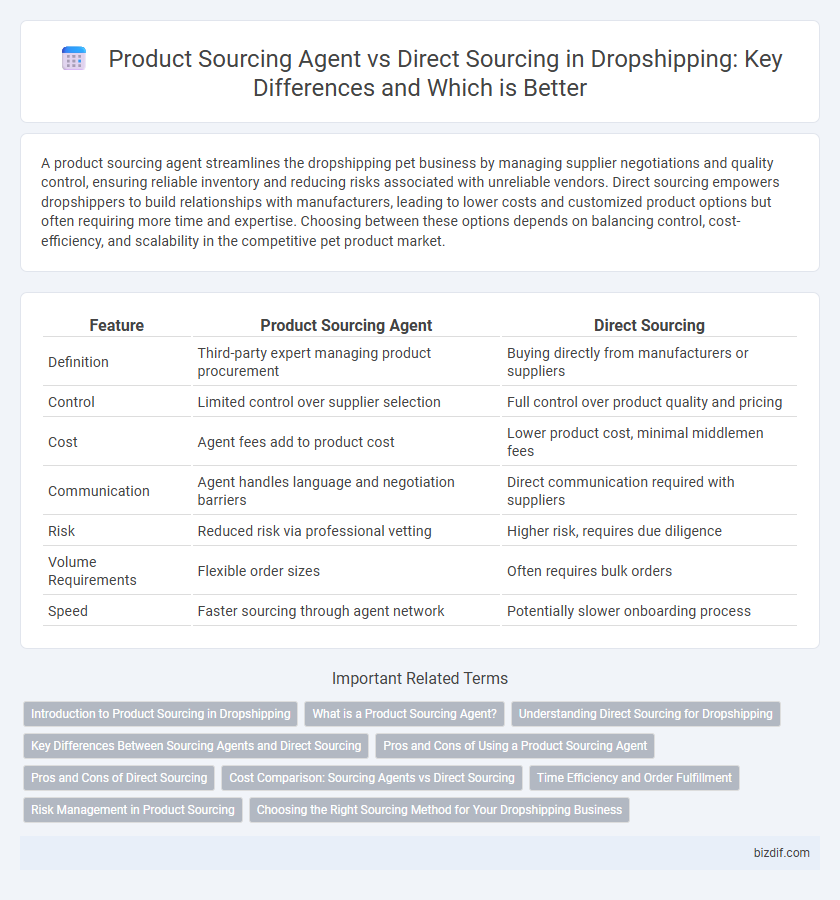A product sourcing agent streamlines the dropshipping pet business by managing supplier negotiations and quality control, ensuring reliable inventory and reducing risks associated with unreliable vendors. Direct sourcing empowers dropshippers to build relationships with manufacturers, leading to lower costs and customized product options but often requiring more time and expertise. Choosing between these options depends on balancing control, cost-efficiency, and scalability in the competitive pet product market.
Table of Comparison
| Feature | Product Sourcing Agent | Direct Sourcing |
|---|---|---|
| Definition | Third-party expert managing product procurement | Buying directly from manufacturers or suppliers |
| Control | Limited control over supplier selection | Full control over product quality and pricing |
| Cost | Agent fees add to product cost | Lower product cost, minimal middlemen fees |
| Communication | Agent handles language and negotiation barriers | Direct communication required with suppliers |
| Risk | Reduced risk via professional vetting | Higher risk, requires due diligence |
| Volume Requirements | Flexible order sizes | Often requires bulk orders |
| Speed | Faster sourcing through agent network | Potentially slower onboarding process |
Introduction to Product Sourcing in Dropshipping
Product sourcing in dropshipping involves acquiring products for sale without holding inventory, where a product sourcing agent acts as an intermediary to find and negotiate with manufacturers on behalf of retailers. Direct sourcing, by contrast, enables dropshippers to establish relationships directly with suppliers, often leading to better pricing and quality control. Choosing between a sourcing agent and direct sourcing depends on factors like budget, scale, and the level of control desired in the supply chain.
What is a Product Sourcing Agent?
A product sourcing agent acts as an intermediary who helps dropshipping businesses locate, negotiate, and procure products from reliable suppliers, particularly in international markets such as China. These agents provide valuable services including quality inspection, price negotiation, and shipping coordination, reducing risks associated with direct sourcing. Utilizing a product sourcing agent streamlines the supply chain process, ensuring authenticity and cost-efficiency for e-commerce entrepreneurs.
Understanding Direct Sourcing for Dropshipping
Direct sourcing for dropshipping involves purchasing products straight from manufacturers or wholesalers, eliminating intermediaries to reduce costs and increase profit margins. This method requires establishing reliable supplier relationships, managing quality control directly, and handling inventory logistics to ensure timely delivery. Understanding the nuances of direct sourcing helps dropshippers optimize their supply chain and maintain competitive pricing in the market.
Key Differences Between Sourcing Agents and Direct Sourcing
Sourcing agents act as intermediaries between dropshipping businesses and manufacturers, offering expertise in supplier vetting, negotiation, and quality control, which can reduce risks and save time. Direct sourcing involves contacting manufacturers or wholesalers without intermediaries, allowing for potentially lower costs and greater control over the supply chain but requiring more effort in communication and negotiation. Key differences include cost structure, communication efficiency, and the level of control over product quality and customization.
Pros and Cons of Using a Product Sourcing Agent
Using a product sourcing agent in dropshipping offers the advantage of expert market knowledge, faster supplier vetting, and streamlined communication, which significantly reduces risks associated with counterfeit products and delays. However, relying on sourcing agents can introduce additional costs, potential conflicts of interest if agents work with multiple clients, and less direct control over supplier negotiations compared to direct sourcing. The choice between using a sourcing agent and direct sourcing hinges on balancing time efficiency against cost control and transparency in supplier relationships.
Pros and Cons of Direct Sourcing
Direct sourcing in dropshipping allows for greater control over product quality and supplier relationships, often resulting in lower costs and higher profit margins. However, it requires significant time investment to identify and verify reliable manufacturers, and managing logistics can be complex without intermediary support. Businesses must balance the benefits of customized sourcing with the risks of supply chain disruptions and increased operational responsibilities.
Cost Comparison: Sourcing Agents vs Direct Sourcing
Using product sourcing agents in dropshipping often reduces upfront costs due to their ability to negotiate bulk pricing and handle logistics, potentially lowering shipping fees and customs duties. Direct sourcing can require higher initial investment in vetting suppliers, managing communication, and navigating import regulations, increasing time and monetary expenses. Sourcing agents streamline the supply chain, offering cost-effective solutions, whereas direct sourcing demands more resources but may yield higher profit margins through eliminated intermediary fees.
Time Efficiency and Order Fulfillment
Using a product sourcing agent in dropshipping significantly enhances time efficiency by handling supplier negotiations, quality inspections, and logistics coordination, allowing merchants to focus on marketing and sales. Direct sourcing demands more hands-on management, often leading to longer lead times and increased risk of order delays due to the need for direct communication with multiple suppliers. Order fulfillment processes tend to be smoother and faster with sourcing agents as they consolidate shipments and ensure compliance with import regulations, reducing the chances of stockouts and delivery errors.
Risk Management in Product Sourcing
Engaging a product sourcing agent can significantly mitigate risks in dropshipping by leveraging their expertise in supplier verification, quality control, and logistics management. Direct sourcing offers greater control and potentially lower costs but increases exposure to risks such as fraud, inconsistent product quality, and supply chain disruptions. Effective risk management requires balancing the reliability and due diligence provided by sourcing agents against the hands-on oversight possible with direct sourcing.
Choosing the Right Sourcing Method for Your Dropshipping Business
Selecting the right sourcing method for your dropshipping business significantly impacts cost efficiency and product quality. Using a product sourcing agent can streamline supplier negotiations, quality inspections, and logistics management, ideal for beginners or those lacking supplier networks. Direct sourcing offers greater control and potentially lower costs by working directly with manufacturers, but requires more time and expertise in supplier vetting and communication.
Product Sourcing Agent vs Direct Sourcing Infographic

 bizdif.com
bizdif.com